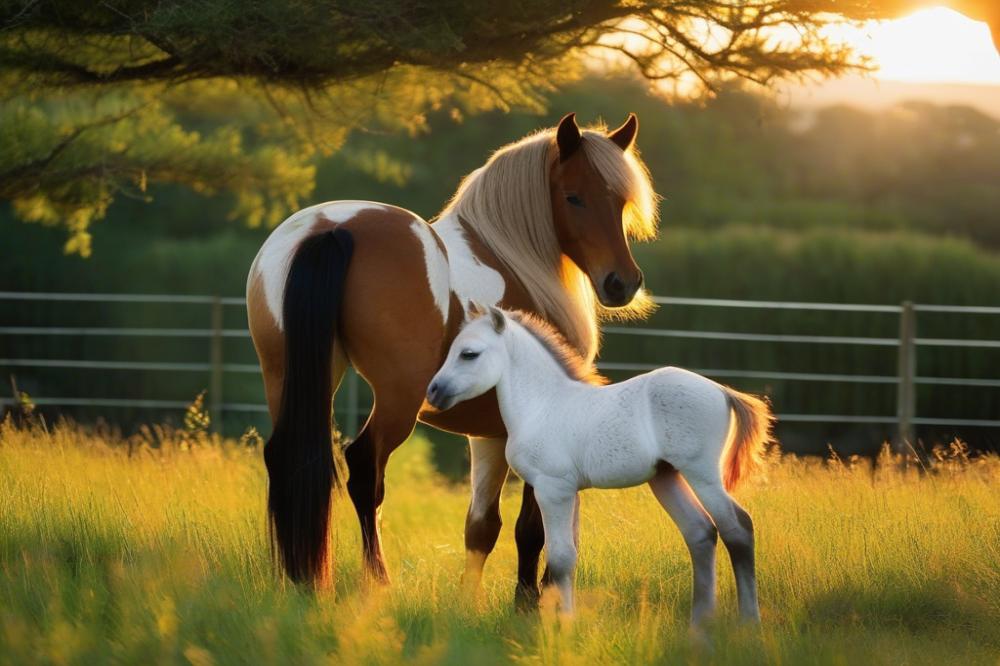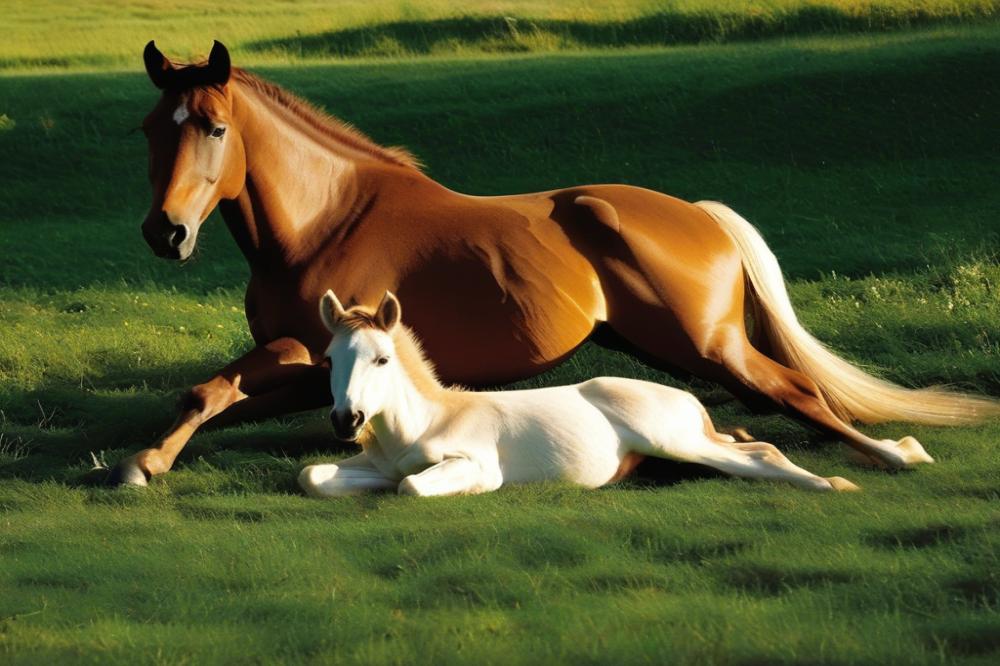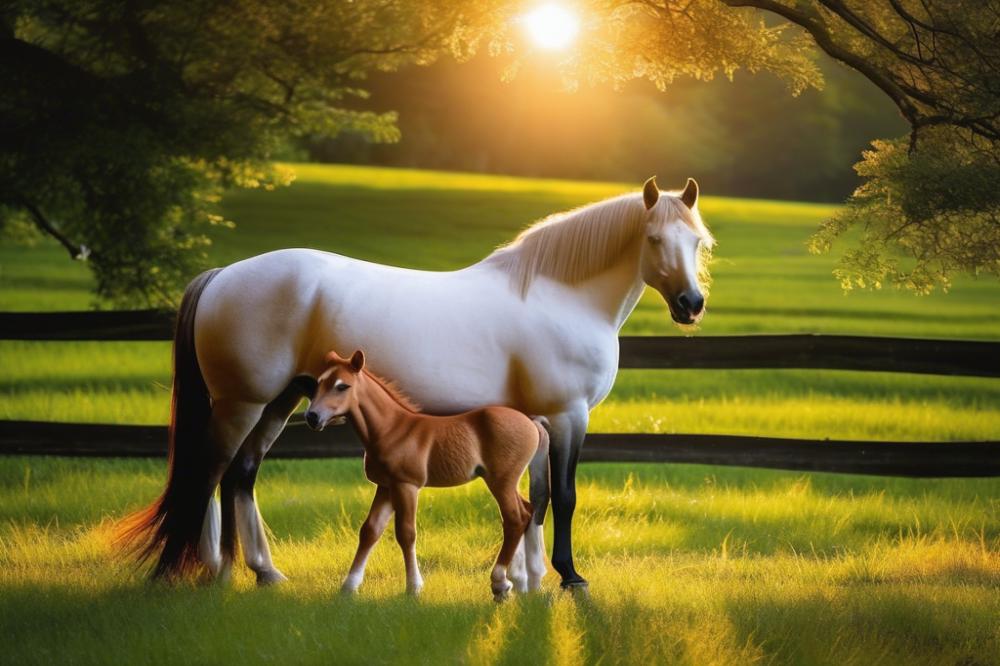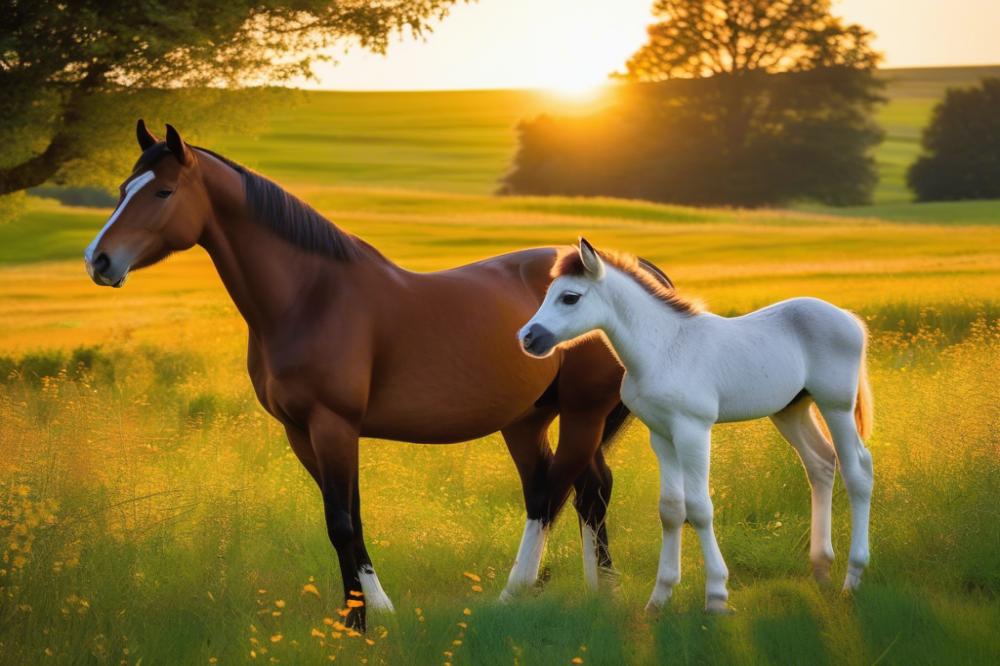The Lifelong Impact of Early Foal Nutrition
Nutritional needs play a vital role in horse breeding. For breeders, providing the right food and care during a foal’s early days is crucial. This period is often the most formative in a horse’s life. The early stages dictate not just immediate health but also long-term growth and overall performance capabilities.
Young horses undergo significant changes rapidly. Their bodies and minds are developing at an astonishing rate. If they lack the proper nutrients during this critical time, the consequences can be profound. Poor nutrition can lead to various health issues that may affect them throughout their lives. Weak bones, inadequate muscle development, and compromised immune systems can all result from insufficient nutrition in foals.
Improper feeding practices can hinder a foal’s potential. It is important to recognize that the right balance of vitamins, minerals, and other essential nutrients sets the foundation for future success. As foals grow, their nutritional needs evolve, making it imperative for breeders to understand how to adapt their diets accordingly. Awareness of these needs can influence soundness, behavior, and athletic ability as the horse matures.
This article aims to delve deeper into how early Foal Nutrition significantly impacts their lifelong health and performance. Readers will learn about the essential nutrients, feeding strategies, and the physiological changes that occur during Early Development. Understanding these aspects empowers breeders to optimize care for their foals and promotes healthier, more capable horses in the long run.
Understanding Foal Nutrition

Foal nutrition refers to the dietary needs of young horses during their initial growth stages. This topic is critical because the early months of a foal’s life set the stage for its future health and performance. Providing adequate nutrition helps foals grow strong, develop properly, and establish a solid immune system.
Colostrum is an essential dietary component. It is the first milk produced by the mare after giving birth. Rich in antibodies, colostrum helps build immunity in foals. This is crucial because foals are born without any immunity to diseases. Consuming colostrum shortly after birth is necessary for a healthy start.
The mare’s milk plays a significant role as well. It is packed with nutrients required for growth. Nutrients such as proteins, fats, vitamins, and minerals are all present in her milk. The balance of these nutrients supports muscle and bone development. Furthermore, the milk contains lactose, which aids in energy supply.
Key nutrients are vital for growth and overall development. Proteins are necessary for building tissues and muscles. They help the foal gain weight and strength. Fats provide energy and support cell growth. Vitamins and minerals, like calcium and phosphorus, are also important. They contribute to bone density and metabolic functions.
Newborn foals are capable of absorbing these nutrients effectively. Their digestive systems are designed to take in milk efficiently. Initially, foals rely on their mother for all nutritional needs. After a few weeks, they start to graze and consume solid food. Transitioning to solid foods must be gradual, ensuring they continue to receive all necessary dietary components.
Attention to early nutrition is imperative. A well-nourished foal will likely grow into a healthy adult horse. In contrast, poor nutrition can lead to developmental issues and health problems later on. Therefore, understanding these dietary requirements can significantly impact a foal’s long-term well-being.
Growth and Development

Proper nutrition plays a crucial role in the growth rates and overall physical development of foals. When foals are young, their bodies require specific nutrients to support their rapid growth. Each growth stage presents different dietary needs that are essential to ensure healthy development.
From birth to three months, foals primarily depend on their mother’s milk. This milk provides vital proteins, fats, and carbohydrates. Foals typically gain weight quickly during this stage, so it’s important for the mare to have a balanced diet to produce high-quality milk. After about three months, foals begin to nibble on solid foods like hay or pellets.
The next stage, from three to six months, is critical. Young foals need to gradually increase their intake of solid food. Nutritional requirements shift as they grow. A mix of good-quality forage and specially formulated feed helps support their growing bones and muscles. This period is when skeletons develop rapidly, making it crucial to provide adequate calcium and phosphorus. These minerals help build a strong foundation.
Between six to twelve months, foals experience a unique growth spurt. They can consume a larger amount of solid food by now. Nutritional balance becomes even more important at this stage. Young horses need enough energy to promote muscle development while maintaining a healthy weight. Overfeeding can lead to obesity, affecting their future health and athletic ability.
During the final growth phase, from one year to two years old, foals become yearlings. Their nutritional needs still include adequate vitamins and minerals. Proper nutrition supports their transition into adulthood while promoting healthy joints and overall fitness. Growth plates continue to close during this phase, which emphasizes maintaining a balanced diet.
Overall, maintaining a balanced diet is vital for supporting skeletal and muscle development all through these stages. The food given not only affects current health but also impacts long-term performance and vigor. By paying attention to nutritional needs at each stage, owners can set their foals up for successful and healthy lives.
Health and Immunity

Early nutrition plays a critical role in the development of the immune system in young horses. A foal’s capacity to absorb essential nutrients directly impacts its overall health and ability to resist diseases. When a foal consumes high-quality colostrum, it receives vital antibodies. These antibodies are crucial for building immunity during the early weeks of life.
Vitamins and minerals contribute significantly to a foal’s immune function. For instance, Vitamin E and selenium are powerful antioxidants that help protect cells from damage. They also aid in maintaining a strong immune response. When these nutrients are lacking, a foal may become more susceptible to infections.
Iron is another important mineral that supports the immune system. It facilitates the production of red blood cells, which transport oxygen. Adequate oxygen supply is necessary for a foal’s growth and vitality. Without sufficient iron, the risk of anemia increases, potentially compromising the immune system.
Trace minerals such as zinc also affect immune function. Zinc plays a role in the development of immune cells and assists in the healing process. Ensuring that foals receive the right balance of these nutrients helps in fostering their overall health.
Moreover, the role of early nutrition extends beyond just vitamins and minerals. The digestive system of a foal is still developing, which means that proper feeding practices are essential. If a foal cannot absorb enough nutrients effectively, its body may struggle to fend off illnesses.
Probiotics can also enhance gut health, which is closely linked to immune function. A healthy gut flora influences how well a foal digests and absorbs nutrients. Therefore, strong digestive health supports a robust immune response.
Providing a balanced diet that includes all necessary nutrients is essential for optimal growth. Malnutrition in critical periods can lead to long-lasting effects on health. Thus, understanding the connection between nutrition and immunity is vital for raising healthy foals.
Feeding Strategies
Effective feeding strategies for young foals play a crucial role in their health and development. Starting from birth, a foal should receive colostrum within the first few hours of life. This first milk is rich in antibodies that help protect against disease. A foal’s gut is designed to absorb these nutrients better shortly after birth. Ensuring that the foal drinks enough colostrum is vital, as it sets the stage for a strong immune system.
A gradual transition to solid food should begin around two months of age. Young foals might start nibbling on hay and creep feed while they still nurse. This gradual process helps their digestive systems adapt to new foods. Choosing high-quality hay is important. It should be fresh, clean, and free from mold. A mix of grass and alfalfa hay can provide beneficial nutrients.
Timing of Weaning
Weaning is a significant change for a foal. Most experts recommend weaning at around 4 to 6 months of age. At this stage, foals are often eating enough solid food and can thrive without nursing. The timing of weaning can vary based on the foal’s growth and development. Observe the foal’s body condition and feeding behaviors to decide the right moment.
After weaning, keep the diet balanced to support continued growth. Gradually introduce more pasture and grains, adjusting for the foal’s needs. Monitor their intake to avoid overfeeding or underfeeding. This transformation phase can be stressful, but providing a calm environment helps ease the transition.
The Role of Supplements
Supplements can play an important role in a young foal’s diet. They may help fill nutritional gaps in their feed. Look for a balanced supplement that contains the right vitamins and minerals. Read labels carefully to choose a quality product. Some supplements are specifically designed for young horses, offering additional support during their growth stages.
Adjusting diets as foals mature is necessary. Growth rates can fluctuate, and nutrient demands increase. Young horses reaching around a year old will need more energy-dense diets, especially if they are growing quickly. Regular veterinary check-ups can help track growth and dietary needs, allowing for timely adjustments. Keeping a close eye on their health and body condition will provide important insights into their dietary requirements.
Long-Term Effects on Performance
Nutrition during early growth stages is crucial for a horse’s development. Choices made in a horse’s diet early on can shape its athletic abilities later in life. Some studies indicate that foals receiving balanced nutrition are more likely to excel in competition.
Stamina is a key factor in equine performance. Proper feeding during the first months can lead to stronger muscles and better endurance. Horses that received adequate protein and energy sources often show improved physical capabilities. Researchers have linked specific nutrients to the development of cardiovascular functions and muscle structure.
Resilience is another area impacted by early dietary choices. Horses that have a diet rich in essential vitamins and minerals tend to be more robust against injuries and stress. These animals often recover faster from exertion, benefiting from a strong foundation built in their formative months.
The relationship between nutrition and performance is not just theoretical. Studies consistently find that horses with early nutritional support perform better in competitions. Their ability to maintain peak performance levels often surpasses those that lack proper nourishment during foalhood.
Coaches and trainers often advocate for a careful approach to a horse’s early diet. They understand that a healthy start can translate to better competition results. Athletes flourish when they have strong beginnings. Incorporating high-quality feeds sets the stage for long-term success.
Overall, the data suggests that initial nutritional inputs play a vital role in future performance. Feeding decisions made during a horse’s early life can have lasting implications. Future athletic prowess may hinge on choices made in a seemingly short window of time.
Veterinary Care and Monitoring
Veterinary care plays a vital role in managing the nutrition of foals. Regular health checks can help spot any issues early. A veterinarian can assess a foal’s nutrition needs based on age and growth. Monitoring growth patterns is essential for ensuring that a foal is developing properly. Growth should be steady; any sudden changes can indicate problems.
Nutrition assessments are a key component of routine veterinary visits. These evaluations can help to fine-tune dietary plans tailored for the specific needs of each foal. During these assessments, weight checks and body condition scoring are often used. Both provide valuable insights into the foal’s overall health.
Working with veterinarians offers opportunities to create effective nutrition strategies. Communication is key; ask questions to understand what your foal needs. Follow the vet’s advice on feed types and portion sizes. Keep records of your foal’s diet and growth, as this information aids future nutrition plans.
Scheduling veterinary visits should be a regular task. Maintaining a routine helps develop a proactive approach to health and nutrition. Being observant about any changes in behavior or appetite can provide vital clues to the overall well-being of your foal.
Finally, consider developing partnerships with equine nutritionists. These experts can collaborate with veterinarians to formulate an optimal diet plan. Combining their knowledge can lead to better outcomes for your foal. Together, everyone can contribute to a healthy start in life.
Final Thoughts
Careful attention to a foal’s diet in the early stages sets the foundation for a horse’s future. Proper nutrition plays a crucial role in the growth and overall health of a young horse. Horses that receive balanced diets during their formative weeks often show better physical development and performance later in life.
Breeding practices should prioritize nutritional needs right from birth. Providing the right nutrients can significantly influence not just size, but also muscle development and bone density. Nutritional shortcuts can lead to long-term health issues that may arise during a horse’s adult life.
Investing time and resources in a foal’s early diet is an investment in their future well-being. When breeders are mindful of these needs, they help create horses that are healthier and more successful. Everyone involved in the raising of foals can have a lasting impact. Ultimately, what we feed them at the beginning shapes their journey as they grow and mature.



